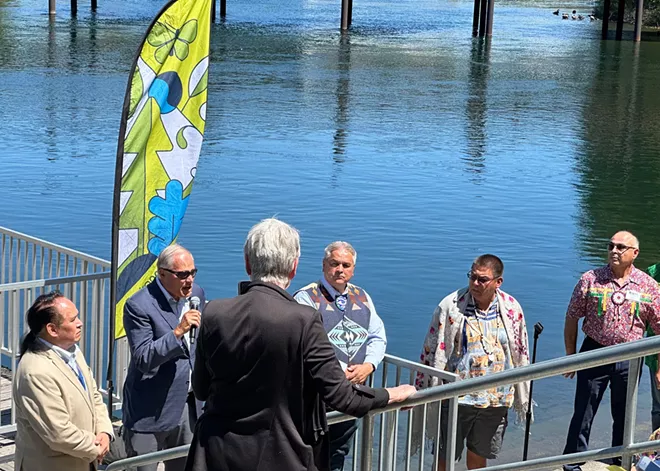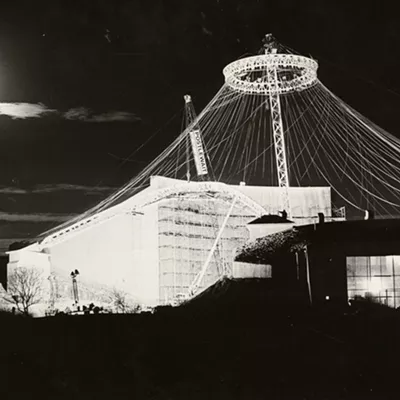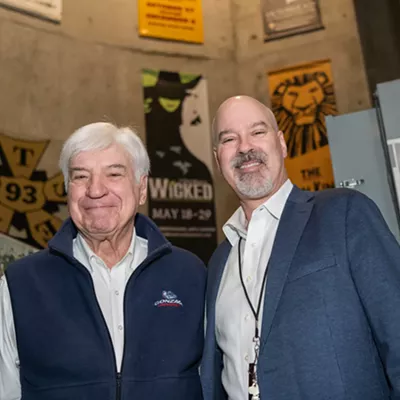
As a crowd of more than 200 people gathered on the riverside steps behind the Spokane Convention Center for a symbolic salmon ceremony last Friday, Darnell Sam, the salmon chief for the Confederated Tribes of the Colville Reservation, called tribal members young and old to join him up front.
Each spoke a few words of thanks for the water, and for the fish, and voiced the hope that salmon might one day return in a healthy way to the Spokane River.
Then, Sam turned toward the water and sang to the absent salmon in the language of his tribe, his voice echoing through the corridor, a solemn tribute to the fish.
Those present were attending the Legislative Summit, a callback event hosted by The Lands Council in honor of the 50th anniversary of Expo '74, in collaboration with the tribal pillar, one of five groups that have been hosting events throughout this summer.
Earlier in the morning, during a breakout session on indigenous rights, Sam spoke about the salmon ceremony and the deep connection we all have with nature.
"It might seem cliche that water is life, but really it's not just water, it's what's within the water," Sam said. "We need to educate the people that we are working with to understand: Bring yourself back to the land. When you go to dig roots, put your hand in the dirt and shake hands with Mother Earth. When you go to the water, shake hands with the water. You'll feel the spirit of her, and it'll renew you."
The Legislative Summit was modeled after a very similar symposium held during Expo. Unfortunately, the original event never led to the legislative changes that its planners had envisioned might help the environment, said Amanda Parrish, Lands Council executive director, as she opened the summit on Friday morning.
"No elected officials or policymakers were at those discussions," Parrish said. "It seems that not enough policy was put into place."
This time, in hopes of inspiring actual change, organizers ensured that several lawmakers from across the state attended the June 21 event to hear from regional leaders in a variety of areas, including: Indigenous rights; child care, youth and education; climate and the environment; housing and homelessness; and health disparities.
"I think it's high time that we the people of the Inland Northwest celebrate ourselves as the environmental leaders that we are," Parrish said.
POSSIBLE SOLUTIONS
Each of the breakout sessions discussed countless actionable ideas. The facilitators from each session shared their takeaways at the end of the day.In the Indigenous rights breakout, state Rep. Chris Stearns, D-Auburn, heard from members of several regional tribes. Major ideas included removing the lower Snake River dams to restore property to Native Americans who lost their lands, ensuring that tribal youth have the opportunity to leave school as needed to gather traditional foods, and ensuring that tribes have enough health care providers as they face health issues from legacy contamination and are impacted by the opioid crisis.
Stearns told the breakout group he was inspired to look at ensuring students can receive credit when they leave class for subsistence gathering. He also said he'll continue working on how the state locates green energy projects, as they shouldn't infringe on sovereign tribal rights.
The environmental breakout session similarly focused on ensuring that environmental projects don't place undue burdens on low-income people. One bill they hoped could move forward would support distributed energy generation, spreading out new renewables rather than creating massive wind or solar farms.
The immigrant and refugee group suggested that there is more work to be done to ensure language access, particularly when it comes to the ability to vote and participate in local decision making. The group also suggested that regional universities could build public-private housing for refugees similar to the Thrive International apartments that are underway in partnership with the Spokane Public Library.
The housing group highlighted the importance of building more housing and of passing stronger renter protections so people can continue to afford to stay in their homes.
The health disparity group discussed the importance of medical education so providers truly understand the needs of their patients. They suggested telehealth could expand access to care and reduce climate impacts.
The child care and education group focused on the dramatic impacts that early childhood education can have on a person's life, and how it's essential to break the school to prison pipeline. Minority and low-income neighborhoods are disproportionately hot due to a lack of shade, which can affect mood and health, and the group suggested continued tree canopy work.
"Nothing is stopping us from being leaders and responding boldly and justly to the current climate crisis," Parrish said at the conclusion of the event. "These sessions have really highlighted the breadth of our environmental challenges, but also showcase the solutions that we are capable of when we work together." ♦
























